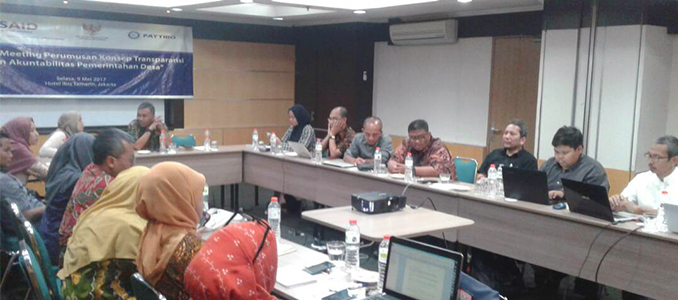
Law Number 6/2014 concerning Villages (Village Law), gives residents the right to participate in the administration of village government (Pemdes). This is because the Village Law constructs villages as self-governing communities that adhere to democratic principles, which lead to the realization of accountable village government through the implementation of information disclosure.
However, this condition has not gone according to expectations so far. This was stated by Researcher at the Center for Regional Studies and Information (PATTIRO), Bejo Untung at the Expert Meeting on the Formulation of Village Government Transparency and Accountability Concepts at the Ibis Tamarin Hotel, Central Jakarta, Tuesday, May 9 2017, “There has been no report regarding the implementation of systematic information disclosure from the Village Government, except for the information conveyed on information boards,” said Bejo. “The information conveyed is more in the nature of instructions from the district, such as making billboards about the Village APB,” he continued explaining.
This expert meeting itself is intended to obtain input from experts to improve the Village Government Public Information Service Standard Guidelines (Village SLIP) whose draft has been prepared by the Central Information Commission (KIP) and PATTIRO. Apart from experts, this activity was also attended by representatives from several state institutions, including the Ministry of Villages and Development of Disadvantaged Regions and Transmigration (Kemendesa PDTT), the Corruption Eradication Commission (KPK) and the Ombusdman of the Republic of Indonesia (ORI).
PATTIRO Village Specialist, Agus Salim added, the existence of instructions is deemed urgent considering the Village’s inability to disclose information in general there is no technical guidance that helps the Village Government to carry out this information disclosure.
“Village residents often ask for information directly from every device they encounter, there is no standard mechanism for the community or the Village Government regarding requests for information,” added Agus. According to him, through the Village SLIP, the Village will be able to provide the information needed, on the other hand, the district government is encouraged to provide support in the form of providing media.
Regarding SLIP itself, several recommendations have been given by the expert meeting participants. First, the material contained in the SLIP should be aligned with nature or habits that have developed culturally and been passed down from generation to generation in the village. These administrative technical instructions should be able to be implemented in interplay with community culture. Second, Village SLIP must be able to strengthen village communities in the process of monitoring the implementation of village government. Through information disclosure, it is hoped that residents can participate so that Village Government accountability will be realized. Third, the Village SLIP must be harmonized with similar existing regulations, for example Permendagri No. 2/2017 concerning Village Minimum Service Standards. In the Minister of Home Affairs Regulation there are also norms regarding the regulation of the provision of data and information, especially regarding population and land. Fourth, it is necessary to explain the relationship between the Information and Documentation Management Officer (PPID) and the Village PPID so that this relationship can encourage strengthening of the Village PPID. Moreover, PATTIRO and KIP should be able to coordinate with the Presidential Staff Office which is currently developing a Draft Presidential Regulation on One Data. (AR/BJ)




